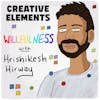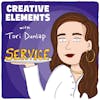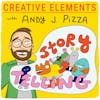
#48: Rosie Sherry – What community building really looks like (beyond the hype)
Play EpisodeRosie Sherry is the creator of Rosieland, a community and resource hub for community builders.
Rosie Sherry is the creator of Rosieland, a community and resource hub for community builders. She previously led community for Indie Hackers, a community of more than 140,000 independent makers.
In this episode we talk about Rosie’s history of building community with Ministry of Testing, what she learned through her time at Indie Hackers, the different forms “community” can take, and why trust is at the heart of improving community participation.
Transcript and show notes can be found here
***
LISTENER SUPPORT
Join our community on Facebook
Support this show through Buy Me A Coffee.
***
SPONSORS
Try Podia and save 15% for life as a Creative Elements listener
Start your free trial of SavvyCal and get your first month free using promo code ELEMENTS
***
ABOUT JAY CLOUSE
Subscribe to my weekly newsletter
Follow Jay Clouse on Instagram
Enroll in my course on podcasting, Podcast Like The Pros
***
PODGLOMERATE NETWORK
This show is a part of the Podglomerate network, a company that produces, distributes, and monetizes podcasts. We encourage you to visit the website and sign up for our newsletter for more information about our shows, launches, and events. For more information on how The Podglomerate treats data, please see our Privacy Policy.
Since you're listening to Creative Elements, we'd like to suggest you also try other Podglomerate shows surrounding entrepreneurship, business, and careers like Rocketship.fm and Freelance to Founder.
Learn more about your ad choices. Visit megaphone.fm/adchoices
Rosie Sherry 0:00
Everything I've learned is has been through communities that people helping me make me helping people, talking about things, sharing things. I honestly don't let use Google that much. I just like you know, go to my people and ask for help.
Jay Clouse 0:15
Welcome to Creative Elements, a show where we talk to your favorite creators and learn what it takes to make a living from your art and creativity. I'm your host, Jay Clouse. Let's start the show.
Hello, my friend. Welcome back to Creative Elements. Thanks for hanging with me last week through a re airing of a Amy Landino and a bonus episode, I was feeling a bit burnt out as I told you, but I'm back today and for the foreseeable future with some great new episodes of the show. And I couldn't be more excited to let you know that right now. I am recording this from my new home studio. Mallory and I have finally moved into our new home after a whole bunch of remodeling for the last month. At least I think that's the right term for what we did here, we painted six rooms in the house, we replaced the bedroom floors, we put up a board and batten accent wall in the bedroom, and we completely finish the basement. And let me tell you, my biggest takeaway from all of this is that I do not recommend trying to skim coat a ceiling. If you have textured ceilings and you're wondering how to get them smooth. Skin coating is a method that basically puts a whole layer of joint compound which is kind of like industrial grade spackle on top of the texture. When it dries, you sand it and you put another layer up, basically repeating that process until the ceiling is completely smooth. We did all that in the unfinished basement here and it was rough many hours many days. But after painting the ceiling, repainting the walls down here laying some baseboard and putting in carpet, the new home office, the new studio for Creative Elements is ready to go. And hopefully that means even better audio for my recordings here. carpet is a lot better than hardwood floors in terms of acoustics. Hardwood floors is what I had in the last home office. And the more the podcast has grown, the more seriously I take little things like this. And so I just wanted to give you a little behind the scenes look at the life of an indie podcaster. Alright, enough about me. Speaking of indie, today, I'm talking with Rosie Sherry, the creator of Rosieland and longtime Community Manager of indiehackers.com. If you listen to last week's bonus episode of my interview with Courtland Allen, you've probably heard of Indie Hackers before. It's a community of independent makers developing profitable side projects, and it's a pretty big community.
Rosie Sherry 2:39
Registered members wise, it's I think about 140,000 people. Daily posts is like 250 people posting, posting something every day. Comments is around 1000 comments a day.
Jay Clouse 2:55
If you hadn't guessed, that's Rosie, she's been managing that forum for the last couple of years. And along the way, she's become one of the foremost thought leaders in the community building space. Or as I like to call it the community community. Rosie's background is as a software tester. And she built an online community for testers back in 2004.
Rosie Sherry 3:15
It started off as software testing club, and then that was a forum like an online forum. And then after like three years, we started Ministry of Testing on the side.
Jay Clouse 3:27
Ministry of Testing, as you'll hear, grew a lot and Rosie found herself hosting several international events each year, earning upwards of a million dollars in top line revenue. She's been building community for years, both online and offline. And I wanted to bring her on the show because over the last year or so, it really seems like the buzz around community building online is reaching a new high.
Rosie Sherry 3:49
So basically like with with my newsletter list with Rosie Lan, I curate a newsletter every week. And when I started it was it was hard to get five or 10 links. But now I say every week I have like 30 links, and I have to think, oh, what am I going to do with all of this? And what what should I cut out whereas before I never had the problem. I was like, you know, I didn't have enough content. Whereas now as I have too much.
Jay Clouse 4:16
Rosie's newsletter that she just mentioned, Rosieland is the go to source for community builders and aspiring community builders to stay up to date on what's going on in the community community. And she's working on a new community building course too. So in this episode, we talked about Rosie's history of building community with Ministry of Testing what she learned through her time at Indie Hackers, the different forms community can take and why trust is at the heart of improving community participation. I'd love to hear your thoughts on this episode as you listen. You can find me on Twitter or Instagram @JayClouse and let me know and if you're not already in our listener community on Facebook, I'd love for you to join. The link is in the show notes. And now without further ado, let's talk with Rosie.
Rosie Sherry 5:02
I started out in the industry as, as a software tester, there just wasn't much around for software testers. So I just felt that there was some kind of opportunity to do something there. And I was quite kind of excited at the time, with like web 2.0. And lots of exciting things happening. And I was like, loved experimenting with the next new tools. And at the time, there was a tool called Ning, which allowed you to like easily host an online forum. So I kind of use that as an excuse to start and a community and basically is for testers at the time, though, the only choice they had was very corporate kind of websites, or conferences that were very expensive. And like, they're all like three days long, and kind of outside of my personal budget, the talking like, you know, at least one and a half k to attend. And I guess like, you know, when you kinda need to test in or don't necessarily have a big salary, it's like any company, you will find that it's kind of like, a lot of money. But on top of that is everything that's very kind of corporatey and salesy, and I was very much in this geeky world, this web world. And as a that that's not for me, there should be something better. So my focus from day one was always to figure out how, how can I make testing more fun? And that kind of remains one of the core aspects of what Ministry of Testing has always been about is that how can we change industry in a fun and human kind of way?
Jay Clouse 6:47
That's a really interesting mission statement to lead to, well, I'll create a forum. So can you walk me through what you meant when you're thinking like, Oh, this could be more fun? Did you want that to be more fun for the individual on a day to day basis? Like in the work itself? Are you trying to change the way the industry worked? Are you just trying to make the job more enjoyable for people who are working it?
Rosie Sherry 7:06
I think it was a bit of everything, right? So traditionally, testing is very boring, or can be perceived to be a very boring industry. And there weren't like, interesting things that were being talked about, or that's what I felt was that, you know, it felt like it was like the same topics over and over again. And there's a strong bias towards certification, like questions to pass certain tests and certification stuff, it was all just like, you know, I felt like there had to be something better than this. But for me, like, I made the content of the forum fun by looking for new discussions to be had. So I generally took my kind of knowledge of testing. And I looked just two more, I guess, trending topics, or interesting things that were happening. Now try to connect the two and talk about that and say, what does this mean for testing? Or how would you test this? Or have you seen this new thing, and so you know, stuff like that. So I was trying to be different from that from that aspect. And then also, like, the fun aspect is, even though like, my original logo attempts, you know, pretty lame, I always, you know, I got some monster type images, actually virus, a bit like COVID virus type images to represent the profile pic was like this, the screen virus, anything. It's just a stock image that I found. But it was different at that time, because no one else especially in the testing world was doing that. So to say this sort of fun image, all other testing websites had, you know, these corporate, fake people in in suits, kind of pretending to do work, I made the promise myself that I'd never ever kind of have any of those kind of images on our website. So yeah, I guess, like a big goal was like, there are certain things that I would never do. So this is, for me, it was it was useful to have those boundaries, I'm never gonna do that. I'm never gonna have these corporate images. I'm never going to talk about certification. You know, I'm never going to X, Y, Z, all these things, you know, I just had boundaries. And I think that was probably helpful to direct the community in a way that ended up being, I guess, quite successful.
Jay Clouse 9:29
Talk about the decision to start the community in a forum. I know events were a big part of this early on, too. So if I'm missing the order of operations here, let me know. But in the beginning, starting this community in 2007, what were you looking at around you as other communities that you pulled inspiration from or maybe modeled, like, how did you decide to go with a forum?
Rosie Sherry 9:50
It seemed like a good idea. Basically, it seemed like fun, it seemed like something that I would enjoy that I was up for doing something that I had wanted to do and hadn't had an opportunity to do it. I think there was like one other testing forum at the time. And that was based on the old kind of forum software that you get, like, the bulletin type forum. And I just thought, well, this, this could, you know, feel fresh, it could feel nice. And it was purely a side project, to be honest. And I just remember, like, launching it. And I knew people I had, like hung out online with testers at the time, there weren't many there. But just the fact that people knew me, that helped me get to let my first 800 members, and I just remember being really happy that 100 people would sign up.
Jay Clouse 10:44
Can you talk about the growth of Ministry of Testing and in kind of the journey that it took up until your time at Indie Hackers?
Rosie Sherry 10:51
Yeah, so the growth was 2007, I started a fun side project, more people joined in joined, I can't I can't remember maybe like by 2010, were like 10,000 members, something around that. And people's, you know that there was a good vibe going on. And it was taking up more time. And I was thinking, what, what am I going to do with this? It's not really making money. I've done little bits of advertising here and there. But you know, it wasn't anything like significant. And I just made a decision. For myself, I'll say, right, this has to make money. So I'm going to register as a business and I'm going to find a way for it to make money. And because like I had been doing it for three years, I knew I knew what the industry was like, and I kind of had a gut gut feel for what what it needed. So I decided to do events, because you know, they were just like no good events, in my opinion, at the time. And this is local to the UK, right, though, like no good local events, affordable, local events. So I focused on that. And that's when Ministry of Testing started, I thought was going to be hard to kind of launch it as software testing club on Ning, it doesn't really have the functionality for it. So I thought it would be easier just to like start a whole other website that's still part of the same company. And the first year we had, we did a conference with the training course we had, but 65, 70 people show up, which you know, is a great number for the first conference, especially when you kind of launch it like three months beforehand, which in hindsight was not a good idea.
Jay Clouse 12:30
That's a short turnaround for an event.
Rosie Sherry 12:32
Yeah, exactly. But you know, you live and learn. And yeah, I mean, that. I think what did it was the fact that we had lots of the people that went to the conference had been in touch with each other online for years, but they had never met. So when the event actually happened, it was so special, it was just like, you know, it was like a reunion. And it was just like this, this like really great vibe. And that's kind of what triggered it. For me, it was like what, you know, I felt like that there was something there. And then I just kind of repeated the same thing every year. So I did another event the next year, that was a bit bigger. That was 100, like 120 people, I did a bit more training on the side. And so it made a bit more money. And then I did the same again the following year. And it was like 150 160 people, so not massive growth. And I think it was like the fourth, fourth or fifth year, then people started asking, like, I think that was when I was selling out like at the venue that we had, which is like 250 people. And we had like extended like pre training days as well. So that actually ended up being profitable enough for me, I guess, actually, like more money than I had ever made. I think like, I guess it 2015 was or 2016 I think I did the Indie Hackers interviews. I was making like 400 or 500k or something. And it was mostly just me running it. Obviously, that's not profit, that's cost. But still, it was like 250 - 300k. And I was just like, how did that happen? I didn't know what to do. I would say I didn't really like look at the money too much. And then like before I realized that I was at all all this money is adding up. So I'd actually started doing experimented with like another event in the autumn. So like we had one event in the spring I started experimenting with another one in order just to kind of keep things going and stuff.
Jay Clouse 14:35
You were selling out the event which was annual at the time. And it was 250 people what was the ticket price like around $1,000 or $500
Rosie Sherry 14:44
No is it was around $200, $300. So like 250 people but then like on the day before it was training days, which were a bit more expensive. So that was like more like $500 per person and then at the biggest Now that we had like other training courses, which varied between one and three days,
Jay Clouse 15:05
Were you putting all of your time into this? Like, what did your it's crazy to think about like, we're ramping up towards one big event in the year, like, what does the entire year look like as far as how you're spending your time?
Rosie Sherry 15:18
To be honest, I don't even know. These days, I don't know, I say, it wasn't full time, full time. Like I had kids and stuff. But definitely like, you know, I wasn't really doing other work. Occasionally, I would freelance doing, like some freelance testing work and stuff, but it was definitely not full time. But it did take up a fair chunk of time, especially in the run up to the event. So, you know, site preparing event is like, I ended up creating a rule where we had to have the lineup for the event six months before the date, the actual date. You know, that's just like, I think that's what people generally do. But there's also a rule that I just came up that made sense, because I realized that a lot of people that ended up buying the tickets came from companies and they need, they need time to get approval and stuff like that. So yeah, these are the kinds of things you learn as you go. And not full time full time. But you know, in the run up to it was always was always kind of busy.
Jay Clouse 16:19
After a quick break, Rosie and I dive into a transition into managing the Indie Hackers community, right after this. Welcome back. Just a couple of weeks ago, Rosie bid farewell to the Indie Hackers community and a post titled after two amazing years of leading the Indie Hackers community, I'm stepping down, asked me anything. In the first comment, the creator of Indie Hackers. Courtland Allen commented, when we needed someone to help with Twitter a couple of years ago in the forum was in total disarray and decline. You threw your hat into the ring. I thought there was no way we could hire you. You were running your own million dollar business. I remember asking you on the phone, you know, this is a job, right. So I asked Rosie how her time at Indie Hackers actually came to be.
Rosie Sherry 17:01
I moved over to Indie Hackers, a couple of years ago now. But it was around that point that I was, I was like, it was around like 2015 that people started asking me to do events elsewhere. And I think like, part of me like regrets saying yes, but at the same time, no, I think you should just say yes. Like a lot of people say say no to things. But I ended up saying yes to a lot of things. And the result was we ended up doing by I think around 2018. We did like nine events across the world. Wow. So we had done San Francisco. We did Philadelphia. We did Brighton in the UK, Manchester, Dublin, Germany, Netherlands, Australia, and New Zealand.
Jay Clouse 17:47
Wow.
Rosie Sherry 17:48
And then on top of that, we had like 100 Global meetups as well. Yeah, this is, you know, it's nuts to kind of think about that. But as that happened, I was like, I realized that basically, Oh, shit. This is not the company I want to run. I've got I've got kids, I don't want to travel. And this is not what I want. So I kind of made the decision to myself, I guess it was around 2017 that I no longer wanted to run it. And the guy who basically when we did events in different locations, I would always partner up with someone who knew the city well enough. So they were basically kind of locals in the city. And the guy who was doing Manchester in the UK, we had already worked together for a while. And he was keen for taking up the role. So I kind of gave him the role of CEO to take over. It was a slow transition. I did it like, you know, over two years, to be honest, slowly, like handed over everything that I knew. And even when I was at Indie Hackers I was still transitioning stuff over.
Jay Clouse 18:51
Where did that opportunity with Indie Hackers come from? Did you approach Courtland or did he say, hey, it looks like you're transitioning, I have one heck of a role for you. What that look like?
Rosie Sherry 19:01
it was more like I was kind of like just like looking for an excuse to hang out Indie Hackers. And I saw he was looking for some help. It wasn't specific community help, but it was more help with Twitter and stuff. And I just reached out and set it up for doing that. And he was a bit confused is that don't you have a company to run? I was Oh , actually I'm just like looking for other things to do. And for me, it's like, I wanted to hang out Indie Hackers. So I thought, well, if I do like the Twitter for it, then would force me to hang out there and I would get paid something at the same time. So I kind of saw it as like a learning opportunity. And then that kind of turned into him just offering me like a community role instead.
Jay Clouse 19:44
Did you understand what you're signing up for? In terms of those numbers?
Rosie Sherry 19:48
Well, it wasn't it wasn't as big when I started. So this is like, you know, I started like, almost two years ago, and it's at least doubled. I think all all stats He's doubled, if not more. So yeah, I guess it's probably more like tripled on some things. But you know the answers, not really. But I like as I said, Minister of Testing, I like to say yes to things and then worry about the consequences later.
Jay Clouse 20:18
Can you talk about what it actually looks like to manage a community of that size?
Rosie Sherry 20:23
Yes, it's a bit of firefighting at times. Indie Hackers is actually pretty good. I think, in many ways in, in the sense, it's got like a really positive vibe. And people generally want to do good things, but also Indie Hackers. It's a community for founders to talk about their projects and their products. And it's, what's an educational post made by someone is a fine line of self promotion, as well. And then if someone else tries to copy that then becomes the cross. It's pure self promotion, which isn't what we want. I think with Indie Hackers, it's quite hard to draw the line of what's marketing spam and what isn't. So I guess to give an example, like, you know, this late Drew Riley and Harry Dry, they quite often post about their projects and stuff they do, but it's highly relevant to Indie Hackers as well. So they're, but they're promoting their businesses, but it's education as well. And then people try to do the same thing. And it just doesn't come across right as a because partly because people don't know them. But partly because they haven't just put as much effort into the content. So there's kind of a lot of a lot of like this, there's an algorithm that is, you know, kind of automated, but you know, there is manual input as well. So generally, I try to make sure that the best content is on the homepage, and the best content gets seen. Because sometimes, there's just really good stuff there that people don't see. And I guess, if you take into context, the data that I said, like 250 posts a day, that means I'm not necessarily reading all of them. But I'm definitely scanning through them, essentially, every day, trying to trying to find good stuff, and trying to find content that matters, and trying to make connections with people and all that kind of stuff. And then I guess on top of that this span is that the more the more popular, and the hackers get some more people try to find ways through. So like, every morning, when I wake up, that's the first thing I check for, who's leaked through the art into our forum and such as, such as life.
Jay Clouse 22:37
Given that there's probably like, an unlimited amount of time, you could spend reading content moderating content, making sure that you're getting attention on the right content, how do you structure your time, if at all, to you know, not just spend all day reading or, you know, do you have any, like practices or routines to help you manage that?
Rosie Sherry 22:57
It's hard to be honest, this honestly, days where I feel like I kind of beat myself up because I feel like I'm not being productive. And, you know, you end the day and you think you look back at it is a lot of actually done today, and you feel like you've done nothing, right? It's tough, especially, especially as it's growing more and more, I think it kind of gets hold on to a routine. So like, I guess like pre COVID, I felt like I had a good routine going and then COVID happened and then everything kinda like the traffic and and I guess general participation in the app is just like, spiked massively. So I was like, ah, and then he kind of slows down a bit, and you start to get a bit more of a sense of normality. But I try, I tried to basically start the day and end the day with kind of like, the queue. And, you know, just going through stuff and tidying things up. But quite often, to be honest, I end up I end up dipping in and out of it, you know, in between quite a lot. But you know, ideally, I guess in an ideal world, I would maybe spend two hours at the beginning of my day in two hours at the end to tidy things up. And then in between, I would be doing like other things like content that I write myself or reaching out to other people. I am organizing meetups as well. The list is never ending basically.
Jay Clouse 24:19
Rosie just used a word that I really like when it comes to community building: participation. A lot of people will talk about engagement when it comes to community. But participation feels like a better word to me. When we talk about engagement, it's usually driven by our own metrics and reporting. We want to see the number of posts and comments go up. But participation speaks more to community members happily and willingly taking part in discussion. In either case, engagement and participation. Community builders are often looking to see their members take part in conversation. So we asked Rosie what she's learned when it comes to encouraging participation within a community. And she told me that it comes down to trust.
Rosie Sherry 24:56
I think a lot of it is kind of setting up the environment. Setting up like a community that has trust as an example of that there's a community that kind of understands who you are, and kind of talks, talks, your language, obviously said, No community is going to be for everyone. But kind of trying to, I guess, trying to set the scene of what you want to see from the community, and not necessarily, I guess, letting the community maybe a bit controversial, but maybe not letting them have the full say, in the way that conversations go. So you might like, see conversations that you don't want to have is enough, you don't think great for the community, and you might decide to not have it seen as much stuff like that. Or you might think that other things are important for the community. And you might try to find, you know, reach out to people to encourage them to do things around certain themes or certain topics. It's hard, because, you know, I think the world changes so fast, especially now with COVID. say, Well, you know, trying to figure out what people need, and in the context of communities is, it's tough, because it's like, you know, if I wouldn't say fighting, but you want people to participate, because if people don't participate, you know, it doesn't make a great community. But at the same time, you don't want to you don't want people participating for the sake of participating.
Jay Clouse 26:29
You just mentioned trust, can you talk a little bit more about how trust plays a role in community.
Rosie Sherry 26:34
To me as a as a community builders and community founder, when I've kind of built communities up, I don't like have like, I don't even have like a year plan, generally, let alone like a three or five year plan. And everything that I've done has been like trust within myself of what, what I what I believe is right, and what I believe like the community needs, but to be able to do that the community needs that have trust in you, as well. And they need to believe in you in what you're doing. There's always going to be strangers, but the more the more we can work together, the better we can figure out like the best way forward. Rather than like having arguments with one another, you could hopefully see through conversations and question things enter, I guess, mature way rather than like having arguments with one another. And I think that's very much like in the foundation of any community builder you have bought, in my opinion is like you have to have that as a foundational thing for a good community.
Jay Clouse 27:40
When we come back, Rosie, and I talk about the growing buzz around online communities, and whether that buzz is a good thing or not. And a little bit later, we get more abstract thinking about what community means across different platforms. So stick around, and we'll be right back. Welcome back to my conversation with Rosie Sherry. Over the last year or so I've noticed more and more buzz around the topic of community online. Even the founder of Reddit, Alexis Ohanian, has said that we will soon be seeing chief community officer within the C suite of major companies. So I asked Rosie if I was just more tuned in now than I ever was, or if she was seeing a similar trend.
Rosie Sherry 28:18
Definitely the last year, I feel like community has definitely kind of blown up even more since COVID. So I feel like when I joined indie hackers two years ago, there was a sense of like, yeah, community is good, we appreciate community. But this, I didn't feel like there was still a lot of going going on for the community industry. In fact, like when I left Ministry of testing, one of the things I was keen on doing is just focusing in on the community industry as a as a place to get to know better, because I had been building communities, you know, I guess since 2007 ish. And I had never found the time to kind of see what was going on in the community world. So I made it my kind of mission to change that. And when I started doing that, I started like with a newsletter, like a website. And when I started that there wasn't a lot, just even a year ago, going on those, it was very clear that there's one, there was one kind of community Slack, which was DMX. And they were the main conference happening. There's, you know, a couple of other kind of community type associations and websites, but really, you know, apart from that, and a few, you know, maybe 10 or 20 people, that was easy. Obviously, it was bigger than that, but visibly as, you know, people blogging and stuff like that there wasn't a lot. I was signing up to all these blogs. And you know, it's like actually, there's not a lot of people blogging, like entirely on community. And now just like one year on, I feel that it's changed massively. And it's not just my it's not just my one for curation efforts, it's just literally that, you know, more and more people are talking about it. You know, there's even VC funds is a VC person, but obviously, with Indie Hacking, but there's, you know, a couple of VC funds that have, you know, appeared as well. And so yeah, it's it's booming, I think a lot of it is still hype, I'm a bit skeptical of a lot of it.
Jay Clouse 30:24
Talk more about that skeptical of what aspect of it?
Rosie Sherry 30:27
Now all of a sudden, everybody wants community without, like, understanding what it is and what the commitment is. So it's like, you know, you know, people like, basically they decide that they want to community without, without doing the proper research into what kind of community they're going to have, and what's involved and what's involved in maintaining it. I had a guy the other day, who started a community and he was like, I've got x amount of members, but it's all quiet and dead now. And I just don't know what to do. Yeah. And that's just so so typical is like, people start stuff, and then it's, it's a ghost town, immediately. And then, you know, like, I think that probably ends up giving community like a bad name. You know, it's that's not what community is like, don't do that. You just don't, don't do it.
Jay Clouse 31:15
Why do you think that's so common? Why do you think that that's something that happens that people start communities without understanding it, and that they ultimately become quiet?
Rosie Sherry 31:24
people fail, it's normal to fail. And I guess that's okay. I guess with communities, it's more visible. So I'm sure there's people who start businesses who start newsletters, you start anything, and they fail, and often fail quickly, just like, like you would with communities. But I think with communities, it's more visible, whereas with a newsletter, it's just like, slowly disappears. Not everyone notices.
Jay Clouse 31:46
It kind of feels like a community is, if you wanna think of it as a product, you know, and how most products fail, the community product value is often inherent in the community itself. So like, it's this flywheel, they had to get turning initially, or there's no value, and then people won't show up, and then the flywheel will start turning. And it just, it just goes downwards. And I think ultimately, what I see happen a lot is people don't really know why they started it, or what it was doing for the people who joined it. They just thought, Well, I have an audience of people, or it'd be nice to build an audience of people. Let me set up a tool and see if it sticks.
Rosie Sherry 32:21
I have no vision, basically, a lot of communities lack of vision. And I think the communities at work tend to have this, like overarching vision, but that people get on board with Indie Hackers has a Ministry of Test and had had that, you know, sure, like Pat Flynn, and Pat Flynn has that as well. You know, like, I'm sure you're more aware of than me, but you know, people get behind them. And I think that's there's a problem with with communities is you don't have to have an audience, you don't have to have people behind you. You know, you can make it work in other ways. But I think generally is that people will have, like a following of some sort. They have that for a reason is that because they care? Quite often I say, well build, you know, build an audience build a following, but it's not really that it's just like, you know, work on something that you care work on it for a year before you even start thinking about building the community?
Jay Clouse 33:17
Can we expand on that point and kind of go down the route of if I am listening to this, and I've been working on something for a year, and maybe I'm starting to build my Instagram account, maybe my Twitter following or my email subscribers, my YouTube following? And I'm starting to think about, maybe I should introduce an element of community into this. What would you recommend people think through as far as like, preparation or what needs to be true or what they should do to help get something kickstarted?
Rosie Sherry 33:45
I would say like, don't use a community tool until you like, absolutely have to, until until it feels it's so painful. That what you're doing like, this doesn't work. I think I got away with it kind of like what's Ministry of Testing because that was 2007. And you know, it's a different world. But you can build you can build community, you know, through email list, you know, there's nothing stopping you from, you know, having conversations, email conversations with people on your email list. You can, you know, ask a question at the end of every email, asking people to respond, you can do now, I'm not a big fan of surveys, but you can do surveys or, you know, I've got a newsletter, then I invite people to meet up every week. So we have, you know, every week at the same time, we meet up and have like, anywhere between one and six people showing up that's that's community. To me. It's very simple. It's like, talk to people, find ways to talk to people, we've got the internet, you don't need a community tool to talk to people.
Jay Clouse 34:47
I feel like the word community is used very flexibly for different situations. You know, if you're a SaaS company, you might use a community tool for your support articles and you refer to that as community, if you are a creator, and you're having these one to one conversations through newsletter responses, you can think of that as community, you can also have peer to peer community where the goal is connecting people to one another. Do you think about things in categorizations? Like that? Or do you have a more rigid definition of what community truly is?
Rosie Sherry 35:20
I don't really like defining what community is, to be honest, I don't think it helps. You know, to me, it's just like people coming together over something that matters, or something that they're interested in, I think people have, they get too focused in on it. And I think that's part of the problem with like community tools, especially in the tech world. So when they think community, they think of a community tool, and that just adds adds to the problem. I quite often see comments saying, or social media is not community, like? Well, it is if you treat it like one, you know, those people, you know, gather over social media all the time, they find ways to do it. I think, you know, you can use hashtags. As an example, you can post AMAs. On Twitter, you could do the same on Instagram, you could do it on you know, anything, you know, it's like to say that that's not community is like, the more you think about it in that way, and talk about it as people start to realize that it actually actually right. And I think like, if you look at the youth, that I've got teenagers, now, if you look at what younger people are doing it, they're not they're not flocking to community tools, from what I understand. I mean, I know that quite often use discord and stuff like that. But if you look at BTS, who use their community to, you know, make a fool of Donald Trump with his, one of his events and stuff is a that's community, is it? How is that not community they're bringing, you know, there are people together to do something, because that's, that's what they identify with. And, you know, all it takes is a tweet.
Jay Clouse 36:56
Totally, I feel like, you know, the root word of community is commune or communal, which just basically means coming together, you know, you keep using this phrase coming together, and it's at the root of community. I've also seen you talk about community being a means of learning and education that people don't talk about enough. Can you talk about that a little bit?
Rosie Sherry 37:17
Yeah. So basically, it's like I've grown up with in the web for the past 15 years, and I've seen things come and go, and I guess, like, I see like, charlatans come and go as well get quick, rich schemes, as well, or business models I don't quite agree with. Because, you know, as I you know, I'm quite into, like, the idea of business and how people make money is that I like to run businesses, and a lot of what I see, like with education now, especially if COVID, I mean, that that throws in a whole other angle. So So basically, I unschool, my kids. So for years, I've just been like a bit, I wouldn't say anti education, but I'd be like, you know, like, I don't believe alternative, I don't believe in the school system. And it took COVID for people to start to realize that actually, maybe the school system isn't as good as what it seems. But you know, it is what it is, you know, say, you know, I don't have issue with people going to school, if you want to go to school, go to school, that's fine. I just don't want to don't don't expect me to send my kids to school. But then you take that angle, and then you take it with people who do courses, and then charge a lot of money for courses, and people don't actually complete the courses. And I thought about stuff like that. And I'm like, well, I've you know, I've obviously bought courses, and I've rarely ever complete them. It's not necessarily the fault of the person who provides them, but it just makes me think this is a better way. And it's made me think, how have I really learned everything that I've learned. And when I asked myself that question, it came back to community, everything I've learned is has been through communities that people helping me meet me helping people talking about things, sharing things. I honestly don't let us Google that much. I just like, you know, go to my people and ask for help. I go on Twitter, I go on Indie Hackers. You know, previously, it was like Ministry of Testing or, you know, I prefer to ask people questions, rather than ask Google because the answers are always more interesting.
Jay Clouse 39:19
They're also more specific and tailored to
Rosie Sherry 39:21
Yeah, yeah.
Jay Clouse 39:21
Because I know that context.
Rosie Sherry 39:23
Yeah. And I just think like, that's a whole area. exciting area, I think to to bear in mind is that obviously there's going to be people like jumping out at all it's an opportunity. But you know, I think it is but you know, I think people should, like respect community with that in mind is like, you know, I tweeted it was it yesterday about marketing sales is just like a open ended question and I haven't actually commented on any of the responses. But you know, it's about has marketing and sales ruined communities because you know, for my experience, that's quite often the case that people come in just trying to promote their products or companies come in trying to advertise. And then they want to control like, what often what slight said or isn't said? Or what's what gets communicated? Or if there's a competitor there, they might get upset, and, you know, stuff like that. So, yeah, I just, you know, I think it's a really interesting time for communities. And I guess, in my Rosie World, of Rosieland, out of my head, I would love it if people kind of respect the communities more and found like a more sustainable and good way to help them thrive.
Jay Clouse 40:39
What does that look like? Do you mean like, financially for the people running the communities? Or how do you mean,
Rosie Sherry 40:45
I think it depends on the community. I mean, I think it's the same, you know, like indie hackers is a bit unique in that sense. So, you know, basically, Indie Hackers was acquired by Stripe, so they, you know, they don't have to make any money. But they have, you know, as a result of that they have different goals to grow. They want to reach and help more Indie Hackers exists, basically. So their goals are going to be different. But I guess in that context, you know, if I'm thinking about common respect, the community is like, come and hang out and, and appreciate the work we're doing. And align yourself with what we're trying to do or don't align yourself with, with your own selfish needs. So that we can help you at least try to help us as well. And it just seems like people don't, don't see that when they go to a community these days, they see it as somewhere to for themselves. And then I guess, like the other angle is like more communities that need to be self sustaining, sustaining, that might need to charge or might need to find some kind of business model. I had to do that with Ministry of Testing, you know, mostly, we did it with events. And over time, we transition to membership, and then we're forced to complete membership when COVID happened. But it's hard. It's hard. You know, I see what mystery testing going through. And it's tough to kind of get people to pay for stuff. But at the same time, you know, they've used the community for years and years and years, yet, quite often, they will just like, continue to stay as free members. And not really appreciate that actually signing up as a paid member, not only not only helps them, but it helps the community as a whole.
Jay Clouse 42:25
Do you think that this increased focus and attention and interest in community is a net positive thing? Do you think that there are any risks with having it be so in vogue right now,
Rosie Sherry 42:37
I guess the biggest risk is that people will community will get a bad reputation, because they'll have bad experiences. But I don't know what you can do about that. I guess the way my mind works is trusting my gut and just like at the end of the day, I can only do what I can do. And I'm just going to keep pushing forward and do the positive things that I believe will make an impact.
Jay Clouse 43:01
If I'm listening to this, and I'm sold on the idea of trying to foster community in my personal creator, ecosystem, whatever that looks like, what advice would you give to people to help them kind of stand out and be sustainable against maybe a new wave of a lot of communities.
Rosie Sherry 43:21
I have this saying now that I quite like. So, first step, I would say is validate your vision. So when I started doing Rosieland stuff, for first six months, I focused on doing the newsletter, but not paying attention to the results of the newsletter, not caring whether people signed up, it was more about whether I felt that I could commit to what I was building, or wanting to build, whether I was interested in, in learning about community building, whether I wanted to connect with people. And that's like a 6, 12 month process, in my opinion, of doing that, because you say you're learning about yourself as much as you are learning about the community you want to serve. And if you get past that stage, then I would say experiment with models. And you know, start growing slowly and just start in a bit be consistent. Rather than being like spiky, in your accidents. It's like do something every day that helps you work towards the like, bigger, bigger goal, but definitely just like experiment with models and business models of how you can make it work. I think there's a strong emphasis towards right paid communities. But, you know, I'd like to think that maybe, you know, he could probably balance it out with other things. You know, you could have a paid community but also have, you know, you use some of the content to create like one off purchases. I read recently somewhere that the data point probably isn't correct because it's 400 times harder to sell a subscription model than it is to sell something that's one or like a one off payment. Then balance in your sponsorships. If you can say think about like, those are probably the three kind of main models as a, you know, sponsorship, one of payments of something and like membership. Membership is tough. It's tough to get people to subscribe for a long period of time. So I think balance. That's what I'm planning at least to say, trying to find that balance.
Jay Clouse 45:23
What if we take a page out of Ministry of Testing's book and do nine global events in a year.
Big thanks to Rosie for being on the show. She has been my go to follow for all things community building over the last several years. It was great to have her here for an hour to talk with her. One of the things Rosie said that really sticks out to me is just how broad the term community can be for creators. I think of community as peer to peer connections between members of an audience and not just the audience itself. But that doesn't mean you need to be tied to a particular community tool. As Rosie said, you can create community on Twitter, Instagram, or all kinds of places. And when you're able to serve as that bridge between two people, that's a powerful bond that you've created to other members of your audience too. You can learn more about Rosie and her work @RosieSherry on Twitter, or at Rosie.land links to both are in the show notes. Thanks, Rosie for being on the show. Thank you, Emily Clouse for making the artwork for this episode. Thanks, Nathan Todhunter for mixing the show and Ryan Skeel for creating our music. If you like this episode, you can tweet @JayClouse and let me know if you really want to say thank you. Please leave review on Apple podcasts. Thanks for listening, and I'll talk to you next week.
Most Popular Episodes
New to the show? Check out some of our most popular episodes.

























